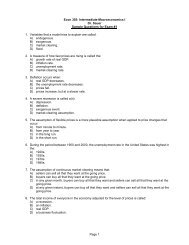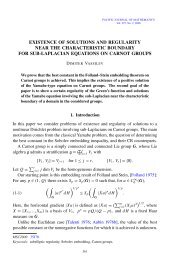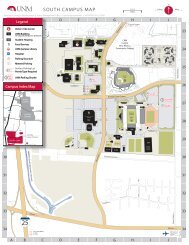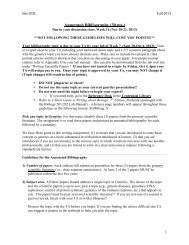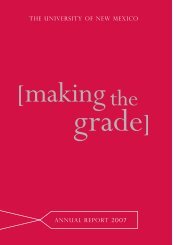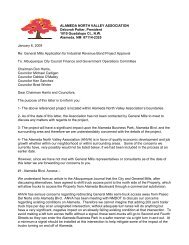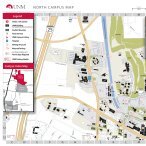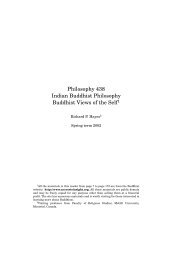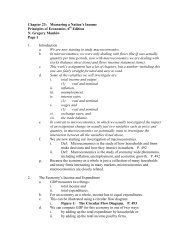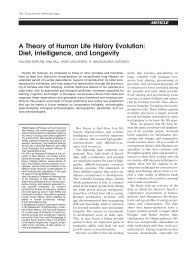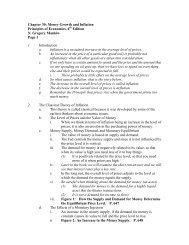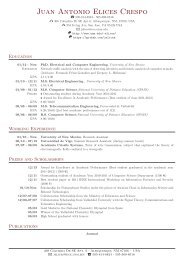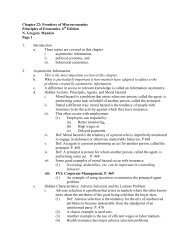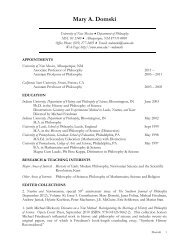Heidegger, Tugendhat, Davidson - University of New Mexico
Heidegger, Tugendhat, Davidson - University of New Mexico
Heidegger, Tugendhat, Davidson - University of New Mexico
Create successful ePaper yourself
Turn your PDF publications into a flip-book with our unique Google optimized e-Paper software.
essential to any consideration <strong>of</strong> truth, gained predominance at an early stage in the analytic tradition;<br />
without prejudice to whether sentences, sentence-types, or propositions are taken as the relevant units<br />
<strong>of</strong> analysis, we shall call them sentential views. 25 By sharp contrast with them, as we have seen,<br />
<strong>Heidegger</strong> recurrently criticizes a “traditional” conception <strong>of</strong> truth according to which the “assertion”<br />
[Aussage] is its primary locus and characterizes the basic phenomenon <strong>of</strong> truth (as aletheia or<br />
unconcealment) as a phenomenon that does not necessarily involve explicit judgment, linguistic<br />
predication, or assertion. This criticism involves <strong>Heidegger</strong> repeatedly in challenging the actual<br />
possibility <strong>of</strong> giving an adequate account <strong>of</strong> truth if one begins with sentences or their linguistic<br />
interrelations; while from the other side, given the basic and essential connection, within the practice <strong>of</strong><br />
a language, between the structure <strong>of</strong> sentences and the possibility <strong>of</strong> saying something true or false, it<br />
can be questioned whether any account <strong>of</strong> truth can succeed without a structural basis in the logical<br />
structure <strong>of</strong> sentences (<strong>of</strong> the kind that Tarski’s account captures).<br />
This difference points in obvious ways to broader methodological and thematic differences in the<br />
traditions and lineages in which the two philosophers have most <strong>of</strong>ten been located. In particular,<br />
<strong>Davidson</strong>’s sentential approach fits centrally within the tradition <strong>of</strong> which both <strong>of</strong> his most important<br />
antecedents, Tarski and Quine, are unquestionably located, that <strong>of</strong> analytic philosophy in the wake <strong>of</strong><br />
the “linguistic turn”; whereas <strong>Heidegger</strong>’s approach, developing from Husserl’s phenomenology, does<br />
not accord the linguistic turn, at least in the form inspired by Frege and first taken by Russell and the<br />
early Wittgenstein, any central methodological priority. Some recent scholarship has emphasized the<br />
ways in which <strong>Heidegger</strong>’s own commitments, particularly with respect to truth, can be seen as<br />
embodying a critical position with respect to those <strong>of</strong> much <strong>of</strong> the mainstream analytic tradition; for<br />
example, Dahlstrom has recently suggested that a major basis for <strong>Heidegger</strong>’s positive views is his<br />
critique <strong>of</strong> a “logical prejudice” which is both historically dominant and also characteristic, according to<br />
Dahlstrom, <strong>of</strong> the analytic tradition <strong>of</strong> Frege, Quine and <strong>Davidson</strong>. On the position that Dahlstrom<br />
presents <strong>Heidegger</strong> as criticizing, the sentence, proposition, or assertoric utterance is the basic locus <strong>of</strong><br />
truth, and the structure <strong>of</strong> truth can only be understood through a systematic reflection on the structure<br />
25 A good example <strong>of</strong> a propositional conception is the view that comes powerfully to the fore in the first remarks<br />
<strong>of</strong> Wittgenstein’s Tractatus:<br />
The world is all that is the case.<br />
And<br />
The world is the totality <strong>of</strong> facts, not <strong>of</strong> things. 25<br />
Here, the contrast is drawn explicitly between a conception <strong>of</strong> the world as inherently structured in such a way<br />
that it can only be adequately revealed or described by means <strong>of</strong> sentences or propositions and a conception (to<br />
be rejected) on which it does not have this kind <strong>of</strong> structure, but is instead simply a collection or totality <strong>of</strong><br />
individual things or objects.<br />
22



